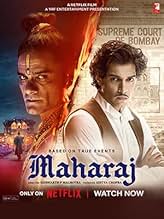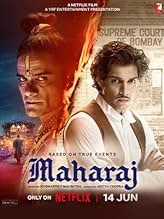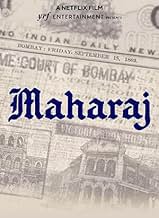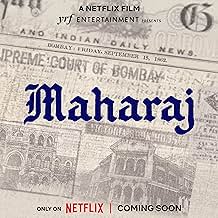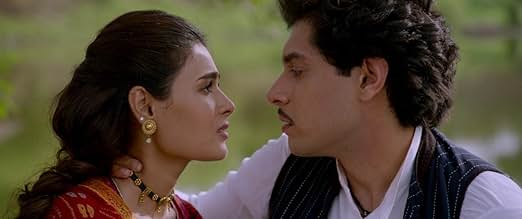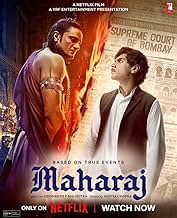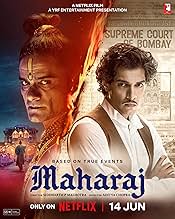Based on a real-life historic court case, a bold journalist questions a revered leader's immoral behavior.Based on a real-life historic court case, a bold journalist questions a revered leader's immoral behavior.Based on a real-life historic court case, a bold journalist questions a revered leader's immoral behavior.
- Director
- Writers
- Stars
- Awards
- 8 wins & 23 nominations total
- Director
- Writers
- All cast & crew
- Production, box office & more at IMDbPro
Summary
Reviewers say 'Maharaj' is a historical drama tackling blind faith and social reform, lauded for its narrative and performances. Junaid Khan's debut and Jaideep Ahlawat's antagonist role are highlighted, though opinions on Khan's performance differ. The film's production, cinematography, and historical context are praised, yet some criticize the screenplay and pacing. It's seen as a resonant, thought-provoking piece on truth and justice.
Featured reviews
I watched the movie 'Maharaj', it talks about a very old ritual called "Charan Seva" which is actually very unhuman and we are surprised to know that ritual still exists in different ways.
When some rituals who made by human become religion then majority of devotees accept and follow. Its very difficult to raise our voice against that types of unhuman activities.
How simple man named 'Karsan Dass' raised his voice against?
How to expose and deal with very old unhumnan ritual when all accepted already?
How to hold self believe when every one against with him?
This type of movie we require because some bad rituals still exists in every religion. So don't think that is only one religion problem.
All the department of movie like story, screenplay, Direction, acting are decent and yes because this is first movie of Amir Khan's son Junaid Khan so people's special eyes on this movie too.
When some rituals who made by human become religion then majority of devotees accept and follow. Its very difficult to raise our voice against that types of unhuman activities.
How simple man named 'Karsan Dass' raised his voice against?
How to expose and deal with very old unhumnan ritual when all accepted already?
How to hold self believe when every one against with him?
This type of movie we require because some bad rituals still exists in every religion. So don't think that is only one religion problem.
All the department of movie like story, screenplay, Direction, acting are decent and yes because this is first movie of Amir Khan's son Junaid Khan so people's special eyes on this movie too.
Maharaj is a pretty decent movie fitting for OTT release. It is well made and brings a real story based on a infamous landmark court case of the 19th century to the screen. Like most period dramas based on stories from 150+ years ago, it represents some fiction and some facts but the movie captures the main essence of the main story. The topic is handled delicately by the director even though the ending seems a bit filmy.
The highlight of the movie is the talented Jaideep Ahlawat who looks divinely evil with a chilling and charismatic smile as the movie's titular antagonist. He truly raises the movie with a very subtle performance. Junaid does a decent job as the movie's protagonist in his debut feature. There are some similarities in acting style with his superstar father Aamir but Junaid lacks the screen and vocal presence of his father. He is decent and does a good job in the movie but at this stage doesnt really sparkle as one would hope. It is still a grounded and well performed role in a serious drama. Only time and mainstream movies will tell if he is a commercially viable actor or a good character actor.
The other actors are decent especially Shalini Pandey who does a good job. Sharvari looks good and is pretty energetic but her role doesnt help the storyline a lot. The sets, design and costumes are pretty good for a period drama. Some of the dialogs are exceptional. The songs are average and actually not required for a movie of such a genre. Overall a decent watch but nothing great. The only 2 reasons to watch the movie are Jaideep Ahlawat for his towering presence and Junaid Khan for the purpose of sheer curiosity. 7/10.
The highlight of the movie is the talented Jaideep Ahlawat who looks divinely evil with a chilling and charismatic smile as the movie's titular antagonist. He truly raises the movie with a very subtle performance. Junaid does a decent job as the movie's protagonist in his debut feature. There are some similarities in acting style with his superstar father Aamir but Junaid lacks the screen and vocal presence of his father. He is decent and does a good job in the movie but at this stage doesnt really sparkle as one would hope. It is still a grounded and well performed role in a serious drama. Only time and mainstream movies will tell if he is a commercially viable actor or a good character actor.
The other actors are decent especially Shalini Pandey who does a good job. Sharvari looks good and is pretty energetic but her role doesnt help the storyline a lot. The sets, design and costumes are pretty good for a period drama. Some of the dialogs are exceptional. The songs are average and actually not required for a movie of such a genre. Overall a decent watch but nothing great. The only 2 reasons to watch the movie are Jaideep Ahlawat for his towering presence and Junaid Khan for the purpose of sheer curiosity. 7/10.
"Maharaj," directed by Siddarth P. Anand, is a compelling historical drama that revisits the landmark Maharaj Libel Case of 1862. With an engrossing storyline, powerful performances, and meticulous attention to historical detail, the film offers a vivid portrayal of a pivotal moment in Indian legal history and society.
Plot Summary The film centers on the Maharaj Libel Case, a significant legal battle in Bombay during the British Raj. The case involves a young journalist, played by Junaid Khan, who exposes the immoral activities of a powerful religious leader from the Vaishnav sect, portrayed by Jaideep Ahlawat. The resulting defamation lawsuit becomes a landmark case, highlighting the clash between truth and power, and the fight for justice and moral integrity.
Acting Performances Junaid Khan delivers a breakout performance as the courageous journalist. His portrayal of a principled young man standing up against corruption and hypocrisy is both compelling and inspiring. Khan's nuanced acting captures the internal struggles and resilience of his character, making his journey profoundly relatable.
Jaideep Ahlawat is equally formidable as the antagonist. His depiction of the charismatic yet morally corrupt Maharaj is chilling. Ahlawat's ability to convey the complexities of a powerful figure facing public scrutiny adds significant depth to the narrative. His performance ensures that the character is not just a one-dimensional villain, but a person with his own vulnerabilities and manipulations.
Direction and Cinematography Siddarth P. Anand's direction is masterful, showcasing his talent for creating a rich, immersive historical setting. His eye for detail is evident in the meticulous recreation of 1860s Bombay, bringing to life the bustling streets, colonial architecture, and socio-political atmosphere of the era. Anand's ability to balance the dramatic courtroom scenes with the broader social context of the time is commendable, making the narrative both gripping and educational.
Historical and Cultural Context The film delves deep into the Vaishnav sect, exploring its beliefs, practices, and the influence of its leaders during the British Raj. Anand presents a balanced view of the sect, highlighting its spiritual significance while also critiquing the corruption that can arise within any institution. This contextual richness adds layers to the story, making it not just a legal drama, but a commentary on the complexities of faith and power.
Set Design and Production Values The set design in "Maharaj" is outstanding, capturing the essence of 19th-century Bombay with impressive authenticity. The attention to detail in the costumes, props, and settings creates a visually captivating experience. The production team's dedication to historical accuracy extends to every aspect of the film, from the grand courtrooms to the modest homes and bustling marketplaces. This meticulous craftsmanship immerses the audience in the period, enhancing the storytelling.
Conclusion "Maharaj" is a powerful and thought-provoking film that excels in both storytelling and historical representation. The performances of Junaid Khan and Jaideep Ahlawat are stellar, bringing depth and intensity to their characters. Siddarth P. Anand's direction ensures that the film is not only a compelling legal drama but also a rich historical tapestry that sheds light on an important chapter in Indian history.
With its engaging narrative, strong performances, and impeccable production values, "Maharaj" stands out as a significant contribution to contemporary Indian cinema. It is a film that challenges, inspires, and transports the audience to a crucial moment in time, reminding us of the enduring struggle for truth and justice.
Plot Summary The film centers on the Maharaj Libel Case, a significant legal battle in Bombay during the British Raj. The case involves a young journalist, played by Junaid Khan, who exposes the immoral activities of a powerful religious leader from the Vaishnav sect, portrayed by Jaideep Ahlawat. The resulting defamation lawsuit becomes a landmark case, highlighting the clash between truth and power, and the fight for justice and moral integrity.
Acting Performances Junaid Khan delivers a breakout performance as the courageous journalist. His portrayal of a principled young man standing up against corruption and hypocrisy is both compelling and inspiring. Khan's nuanced acting captures the internal struggles and resilience of his character, making his journey profoundly relatable.
Jaideep Ahlawat is equally formidable as the antagonist. His depiction of the charismatic yet morally corrupt Maharaj is chilling. Ahlawat's ability to convey the complexities of a powerful figure facing public scrutiny adds significant depth to the narrative. His performance ensures that the character is not just a one-dimensional villain, but a person with his own vulnerabilities and manipulations.
Direction and Cinematography Siddarth P. Anand's direction is masterful, showcasing his talent for creating a rich, immersive historical setting. His eye for detail is evident in the meticulous recreation of 1860s Bombay, bringing to life the bustling streets, colonial architecture, and socio-political atmosphere of the era. Anand's ability to balance the dramatic courtroom scenes with the broader social context of the time is commendable, making the narrative both gripping and educational.
Historical and Cultural Context The film delves deep into the Vaishnav sect, exploring its beliefs, practices, and the influence of its leaders during the British Raj. Anand presents a balanced view of the sect, highlighting its spiritual significance while also critiquing the corruption that can arise within any institution. This contextual richness adds layers to the story, making it not just a legal drama, but a commentary on the complexities of faith and power.
Set Design and Production Values The set design in "Maharaj" is outstanding, capturing the essence of 19th-century Bombay with impressive authenticity. The attention to detail in the costumes, props, and settings creates a visually captivating experience. The production team's dedication to historical accuracy extends to every aspect of the film, from the grand courtrooms to the modest homes and bustling marketplaces. This meticulous craftsmanship immerses the audience in the period, enhancing the storytelling.
Conclusion "Maharaj" is a powerful and thought-provoking film that excels in both storytelling and historical representation. The performances of Junaid Khan and Jaideep Ahlawat are stellar, bringing depth and intensity to their characters. Siddarth P. Anand's direction ensures that the film is not only a compelling legal drama but also a rich historical tapestry that sheds light on an important chapter in Indian history.
With its engaging narrative, strong performances, and impeccable production values, "Maharaj" stands out as a significant contribution to contemporary Indian cinema. It is a film that challenges, inspires, and transports the audience to a crucial moment in time, reminding us of the enduring struggle for truth and justice.
The year is 1862 and the location is India. Based on a true story it is about the ideological clash between a self styled religious guru called Jadunath Maharaj and a reformist cum journalist Karsandas Mulji Karsandas had exposed the inappropriate relationships of Maharaj with women disciples in his newspaper and in retaliation the Maharaj had filed a case of defamation against him. The later portion of the movie focuses on the courtcase where the British judiciary dismisses the case and based on the evidence of the abused women, the court gives instructions to initiate criminal proceedings against the Maharaj.
Director Malhotra P Siddharth has made an absorbing movie which faithfully depicts the people and atmosphere of that era. Both the protagonist Junaid and antagonist Jaideep Ahlawat have been suitably cast in their well written roles. Both have given a good account of themselves. Jaideep is convincing with his towering personality, dialogue delivery and body language while Junaid as the soft spoken and determined journalist (in his debut) is convincing too. Their clash is shown very realistically through the scenes and the dialogue. Sharvari Wagh does well in support. The court scenes in the later part make for gripping cinema.
Director Malhotra P Siddharth has made an absorbing movie which faithfully depicts the people and atmosphere of that era. Both the protagonist Junaid and antagonist Jaideep Ahlawat have been suitably cast in their well written roles. Both have given a good account of themselves. Jaideep is convincing with his towering personality, dialogue delivery and body language while Junaid as the soft spoken and determined journalist (in his debut) is convincing too. Their clash is shown very realistically through the scenes and the dialogue. Sharvari Wagh does well in support. The court scenes in the later part make for gripping cinema.
The film was suddenly shown without any marketing for it, just some news about the participation of Junaid Khan, son of the star Aamir Khan, in the film, in addition to the battle between the film makers and the courts.
The film, from my point of view, is a Bollywood film with all the elements of enjoyable home viewing, but I was I hope that the film tends to narrate history and events in more depth, without songs, performances, and melodramatic dialogues.
The scenery and sets, the costumes and music, the cinematography and the direction, are all good factors in this film.
The acting is very good and a successful start for Junaid Khan, and I hope to see his upcoming works. The film is worth watching, but I expected it to be stronger than what I saw.
The film, from my point of view, is a Bollywood film with all the elements of enjoyable home viewing, but I was I hope that the film tends to narrate history and events in more depth, without songs, performances, and melodramatic dialogues.
The scenery and sets, the costumes and music, the cinematography and the direction, are all good factors in this film.
The acting is very good and a successful start for Junaid Khan, and I hope to see his upcoming works. The film is worth watching, but I expected it to be stronger than what I saw.
Did you know
- TriviaDebut of Junaid Khan.
- How long is Maharaj?Powered by Alexa
Details
- Runtime2 hours 11 minutes
- Color
- Sound mix
Contribute to this page
Suggest an edit or add missing content



